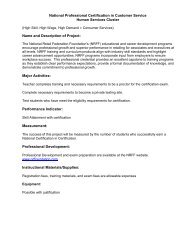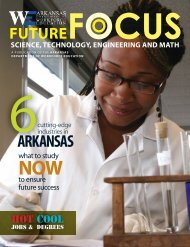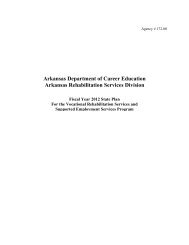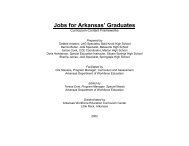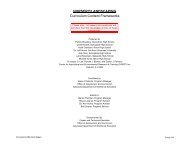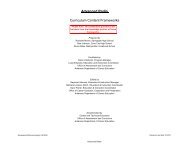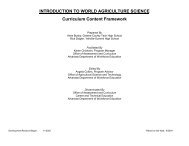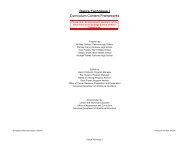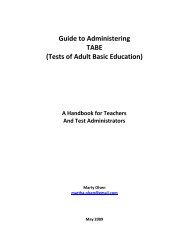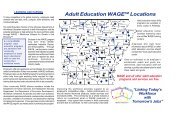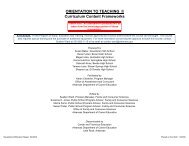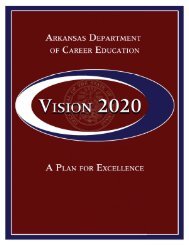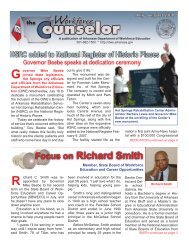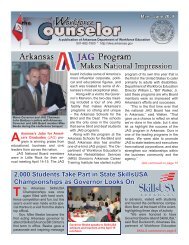Feb-Mar08counselor - Arkansas Department of Career Education ...
Feb-Mar08counselor - Arkansas Department of Career Education ...
Feb-Mar08counselor - Arkansas Department of Career Education ...
You also want an ePaper? Increase the reach of your titles
YUMPU automatically turns print PDFs into web optimized ePapers that Google loves.
page 27<br />
Rehab Summit emphasizes Transition-Centered <strong>Education</strong><br />
I<br />
n an effort to help students with<br />
disabilities successfully make<br />
the jump beyond secondary<br />
education, the <strong>Arkansas</strong><br />
<strong>Department</strong> <strong>of</strong> Workforce<br />
<strong>Education</strong>’s Division <strong>of</strong> Rehabilitation<br />
Services (DRS) held a twoday<br />
transition conference for<br />
educators and administrators in<br />
<strong>Feb</strong>ruary at the Hot Springs<br />
Convention Center.<br />
“Transition at this level is a<br />
priority for state rehabilitation<br />
agencies,” said Ken Musteen, DRS<br />
Chief <strong>of</strong> Field Services. “The<br />
Second Annual Transition Summit<br />
indicates interest in collaborations<br />
between rehabilitation and other<br />
state service agencies so that<br />
young people are provided service<br />
options and activities to ensure<br />
transition from school to work or<br />
from school to post secondary<br />
education.”<br />
Along with a series <strong>of</strong> break-out<br />
groups led by education specialists,<br />
the summit consisted <strong>of</strong> a series<br />
<strong>of</strong> planning sessions broken up by<br />
county so that attendees could<br />
break down ways they felt transition<br />
practices in the state could be<br />
Union County teachers (l-r) Pamala King and Dianne<br />
McCombs, and DRS counselor Suzanne Ward work with<br />
HSRC Administrator and Summit facilitator Barbara Lewis.<br />
improved.<br />
The summit focused on<br />
transition-centered education,<br />
which is meant to make the adult<br />
life <strong>of</strong> a secondary student more<br />
successful. This type <strong>of</strong> education<br />
is expected to bring the student an<br />
improved quality <strong>of</strong> life at home,<br />
school and in the community. That<br />
quality <strong>of</strong> life will likely manifest<br />
itself in independent living,<br />
employment, community citizenship<br />
and participation, leisure and<br />
recreation.<br />
To achieve these goals,<br />
instructors and administrators were<br />
asked to focus on five major ideas:<br />
student-focused planning, family<br />
involvement, program structure,<br />
student development and<br />
interagency collaboration. In their<br />
individual groups, participants<br />
brainstormed on the best ways to<br />
make the transition process as<br />
effective as possible.<br />
Division <strong>of</strong> Rehabilitation<br />
Services Transition Program<br />
Director Judy Smith said the<br />
conference built a sense <strong>of</strong><br />
camaraderie that would work<br />
toward improving the transition<br />
process altogether.<br />
“Some <strong>of</strong> the<br />
local teams got to<br />
know one another<br />
better and got to<br />
learn how to work at<br />
team building<br />
better,” Smith said.<br />
“Working together is<br />
going to help the<br />
transition process<br />
especially in districts<br />
where<br />
involving<br />
they’re<br />
more<br />
partners.”<br />
Organizers<br />
expected<br />
to<br />
implement<br />
some <strong>of</strong> the<br />
recommendations<br />
and<br />
hoped they<br />
would yield Judy Smith<br />
positive results<br />
for Transition<br />
Director<br />
students. Services<br />
Some <strong>of</strong> the<br />
expected outcomes include:<br />
increased student referrals, an<br />
increased number <strong>of</strong> students<br />
receiving specific services, and<br />
perhaps most importantly, an<br />
increased number <strong>of</strong> students<br />
gaining employment.<br />
“We have to make sure these<br />
young people receive the services<br />
they need to make the transition<br />
to work or to post-secondary<br />
education as smooth as possible,”<br />
<strong>Arkansas</strong> <strong>Department</strong> <strong>of</strong><br />
Workforce <strong>Education</strong> Director<br />
William L “Bill” Walker, Jr. said.<br />
“These are individuals who will<br />
make a valuable contribution to the<br />
workforce. With their contributions,<br />
our state will be better, and their<br />
lives will be even more enriched.”<br />
Making a successful transition<br />
out <strong>of</strong> high school isn’t as easy as<br />
it sounds. Fortunately, the<br />
<strong>Department</strong> <strong>of</strong> Workforce<br />
<strong>Education</strong>’s Division <strong>of</strong><br />
Rehabilitation Services’ Transition<br />
Program is helping to make that<br />
step a little easier. For additional<br />
information, contact Judy<br />
Smith, Transition Program<br />
Director, at 501-296-1600.



